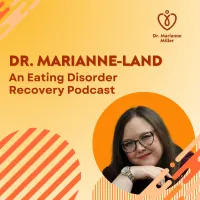Episode Description
Exposure therapy often emerges as the gold standard for ARFID treatment, but for many neurodivergent people it does not address the full picture. In this episode of Dr. Marianne-Land, Dr. Marianne Miller explains why exposure therapy on its own often fails and how sensory-attuned, trauma-informed, and autonomy-honoring care creates a more effective path forward.
CONTENT CAUTIONThis episode discusses food-related trauma, including pressure and force-feeding. Please listen with care and step away if you notice yourself feeling overwhelmed.
DIVING DEEPLY INTO THIS PODCAST EPISODE ON ARFIDMany autistic and ADHD people experience eating through a sensory lens. The challenge is not only about fear of food, but also about the surrounding environment. A noisy cafeteria, bright lighting, or the stress of being watched while eating can all create overstimulation. In those moments, eating becomes almost impossible. Before trying new foods, individuals often need to regulate, calm their system, or spend time in a sensory safe space.
When therapy ignores these realities and relies only on exposure, it can recreate earlier experiences of pressure and shame. That can retraumatize instead of heal. Sensory-attuned care honors nervous system needs, provides autonomy, and includes supports for executive functioning so that real progress becomes possible.
ARFID treatment requires more than repetition. Many people searching for ARFID therapy or ARFID treatment options want approaches that are neurodivergent-affirming, sensory-attuned, and trauma-informed. This episode highlights why exposure therapy by itself often fails and what actually works for lasting ARFID recovery. If you are seeking ARFID treatment that respects autonomy and integrates executive functioning supports, this episode will give you the insights you need.
If exposure therapy has not worked for you or your child, this episode will help you understand why it is not a personal failure. True recovery requires safety, sensory respect, and trauma-attuned strategies that recognize how neurodivergent brains and bodies experience food.
RELATED EPISODES ON ARFID & SENSORY SENSITIVITIES- ARFID, PDA, and Autonomy: Why Pressure Makes Eating Harder on Apple & Spotify.
- Complexities of Treating ARFID: How a Neurodivergent-Affirming, Sensory-Attuned Approach Works on Apple & Spotify.
- Navigating ADHD, Eating Disorders, & Sensory Sensitivities on Apple & Spotify.
Explore Dr. Marianne’s self-paced ARFID and Selective Eating course at https://www.drmariannemiller.com/arfid INTERESTED IN HANGING OUT MORE IN DR. MARIANNE-LAND?
- Follow me on Instagram @drmariannemiller
- Look into my self-paced, virtual, anti-diet, subscription-based curriculum. It is called Dr. Marianne-Land's Binge Eating Recovery Membership.
- Check out my blog.
- Want more information? Email me at hello@mariannemiller.com
